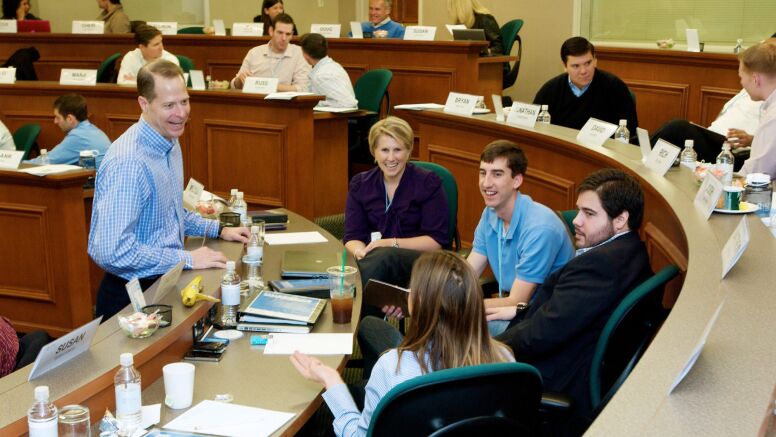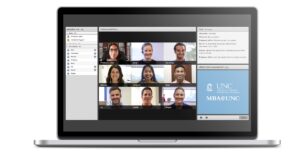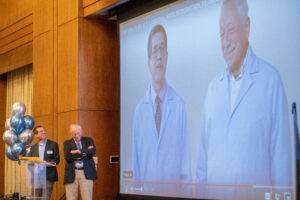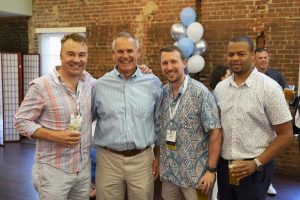News & Stories
Celebrating 10 years of MBA@UNC

In 2010, UNC Kenan-Flagler made a big bet on the future of business education when leaders decided to offer its top-ranked MBA program in a new, online format.
Dubbed MBA@UNC, the School designed a program that makes a Carolina education more accessible – removing barriers that prevented prospective students from coming to Chapel Hill to earn their MBAs.
“As part of the first public university in the U.S., we are proud to provide outreach consistent with UNC’s mission and allow students to earn their MBA from wherever they are in the world,” said then-dean Jim Dean. “We treasure our special culture and are excited to extend it and build community in ways that are not bound by location.”
Dean saw a rare opportunity to lead a transformation in management education.
From the very start, the vision was no compromise – in the quality of the students, curriculum and faculty. Students would meet the same selective admissions criteria required by existing MBA programs. UNC Kenan-Flagler professors would design and teach the courses based on the rigorous curriculum of the Full-Time MBA program. The goal was to define the meaning of quality online education – and build the premier online MBA program.
Not only was UNC Kenan-Flagler entering a new market, it was disrupting both online learning and MBA education with a brand new model. Students would learn in both asynchronous and live sessions on a technology platform designed for graduate education focused on interactive communication and deep engagement. They would learn in person, too, at immersive capstones now called Summits.
“High-quality teaching and learning experiences are critical to our approach, and we are ready to shatter perceptions about online education,” said Doug Shackelford (BSBA ’80), then MBA@UNC associate dean and now dean of UNC Kenan-Flagler. “Technology has transformed all parts of our lives and, ultimately, it will redefine education, too. We have the opportunity to rethink how we teach what our students need to know, and we are excited to be in the vanguard of that change.”
The skeptics
Today it’s easy to forget how bold the move was.
For-profit providers dominated online education, which had a less-than-stellar reputation. Existing programs were viewed as having low-quality, one-way delivery models. And while online MBA programs were not new, few top schools offered them.
The MBA@UNC announcement was greeted with great interest from the media. The public first read about it in the Financial Times’ article “Quality programme to go the distance,” which identified the challenge: “The big question for UNC will be whether it can maintain the quality it offers in its other MBA degrees.”
The Wall Street Journal reported UNC Kenan-Flagler was “taking its brand online” with “the first online program of its kind from a top-20 U.S. business school” in “UNC Makes Risky Online Bet.”
 Calling MBA@UNC a “highly ambitious online MBA program” and a “bold effort to make online education respectable and credible,” Poets & Quants wrote that “Kenan-Flagler will be the highest ranked business school in the U.S. to offer an online MBA program.” It continued: “Kenan-Flagler’s program is significantly different because it is the first time a top-20 school has put together an online effort with the publicly stated goal of making it the world’s best MBA program delivered over the internet.”
Calling MBA@UNC a “highly ambitious online MBA program” and a “bold effort to make online education respectable and credible,” Poets & Quants wrote that “Kenan-Flagler will be the highest ranked business school in the U.S. to offer an online MBA program.” It continued: “Kenan-Flagler’s program is significantly different because it is the first time a top-20 school has put together an online effort with the publicly stated goal of making it the world’s best MBA program delivered over the internet.”
The news met with deep skepticism from students, alumni and the wider business-school community
Most upset were full-time MBA students, who worried an online program could never provide the same quality education, collaboration and community they experienced.
“They said we were going to ruin the reputation of the School by offering online classes,” said Dean.
Amidst student unrest, Shackelford walked into his tax course to find all of his students wearing pink, oversized shirts imprinted with “Get Your MBA in Your PJs.” Their arms were crossed, their mouths shut tight in silent protest.
Dean and Shackelford had been skeptics, too, when 2U (then a startup called 2tor) approached them in 2009 about offering an online MBA program. Dean “just didn’t see how it could work” without interaction between students and faculty, until he saw 2U’s teaching platform, dubbed “The Brady Bunch.”
“I came around to the idea that this was a great opportunity for us and could change the nature of business education at the top schools,” Dean said.
Shackelford was aghast at first, and figured the School’s finances must be desperate to consider it. “I told the dean that this is such a big bet that either he will be a hero for doing it or burned in effigy on campus if it fails,” he said to Poets & Quants.
In time, he became convinced the concept could be revolutionary. He liked that Carolina was getting out in front of its peers to use technology to improve learning – and the idea that something that had never been done before would let schools with outstanding teachers thrive.
And as the School prepared for its first MBA@UNC gradation in 2013, Shackelford said the move into the online space was not just prescient. “It was brilliant,” he told Poets & Quants. Jim Dean “really does deserve a statue.”
The secret weapon
Dean enlisted Shackelford to evaluate 2U’s other online programs, enlist faculty support and lead curriculum design, and later appointed him the first associate dean of MBA@UNC.
“We were excited about pioneering the use of technology to change the way we teach and how our students learn,” said Shackelford. “My approach in leading the faculty with MBA@UNC was, ‘Let’s design an online program that we would be proud to teach in and that our best faculty in the School want to teach in,’” he said. “It was a great opportunity to lead, instead of catching up.”
Faculty had plenty of concerns and almost no experience teaching online, but came to believe it was the right decision.
“When we began planning MBA@UNC, we decided to go forward only if our best faculty chose to develop and teach courses in the program – it would be a volunteer army. No one was going twist their arms. If the best faculty didn’t volunteer to teach in the program, we were not going to run it.”
And they did come forward – over the first weeks and then months and now years, said Shackelford. “I am so proud of my colleagues who have made countless sacrifices to make this program great. That was no small feat for a brand new program using a brand new delivery system.”
 The pioneer faculty to develop the very first classes were Mark Lang in financial accounting; Alan Neebe and Adam Mersereau in analytical tools for decision making; Bill Putsis in marketing; and Heidi Schultz in business communication.
The pioneer faculty to develop the very first classes were Mark Lang in financial accounting; Alan Neebe and Adam Mersereau in analytical tools for decision making; Bill Putsis in marketing; and Heidi Schultz in business communication.
Mersereau, then an untenured assistant professor, and Neebe, a seasoned professor, had worked together in the Full-Time MBA program. “We had no idea what we were doing – it was like building the ship as you’re sailing it – and no idea how much time it would take,” said Mersereau. “Afterwards, we estimated we spent 200 to 300 hours to create the asynchronous content for that course – much of that was Alan in his office with a webcam. It was a ton of work, but we realized this is the way the world is going and we’re invested. We felt we were creating something new here.”
“This was unchartered territory for faculty,” said Jennifer Cutts, director of curriculum and innovation. “Our partnership was designed to make the unknown less scary, and it permitted us to take risks with curriculum and content that is harder to do in more traditional programs. Our faculty began to trust the process and after designing an online class, many said they felt the process made them better teachers in their residential classes.”
Professor Alison Fragale “was initially doubtful about online business education, but now views it as one of the most rewarding” things she has done, she told the Financial Times. “It forces you to take a critical look at your teaching, and recognize how complacent you can become in the face-to-face classroom.”
“Our secret weapon was our faculty. They voted to approve the program because it was best for the School,” said Shackelford. “They put aside their individual concerns, took a leap of faith to build something new, and support the greater good for the School. Their commitment made it possible.”
The partner
“Significantly, the program employs a new business model,” the Financial Times wrote, noting UNC Kenan-Flagler agreed to work with “online learning specialists” 2U to develop and deliver the program. The firm provides the technology platform, instructional design, marketing and infrastructure support to deliver the classes online.
2U had collaborated with leading higher education institutions to deliver rigorous degree programs online in nursing at Georgetown and teaching at USC. Its strategy was to build a first-of-its-kind MBA program with UNC Kenan-Flagler.
Unique features of 2U’s learning management platform include the ability for students to organize discussion groups; for professors to review student profiles and information; for students to store, save and track all assignments; and for student-services staff to monitor a student’s progress – including level of engagement with courses and other metrics to see if they are having difficulty keeping up with parts of the program.
The pioneers
Marketing the program was a challenge. Online MBA programs were relatively rare and “online” means different things to different people.
The School was recruiting students to a program that didn’t exist yet, and, at the same time, designing and producing the courses in entirely new ways – which meant there was no “product” to demonstrate and no graduates to provide testimonials.
It was a leap of faith for the School and for the first students.
Jamie DeMaria (MBA ’13), an executive in the pharmaceutical industry, was the first person to apply and be accepted to enroll in MBA@UNC. He already had a master’s in biology and PhD in neuroendocrinology. He needed a broader business education, but he didn’t want to quit his job, give up his paycheck or relocate his family to earn an MBA from a top business school.

When students and faculty met in person for the first time in 2011 it was like a family reunion.
Other students followed, and the inaugural class of 19 students became both pioneers and partners when the program launched on July 4, 2011. While most Americans celebrated U.S. independence, the working professionals started classes from their home bases in California, New York, Florida and North Carolina and from the cities around the world where work had taken them.
“We were extremely proud of the inaugural class, who were both pioneers and our partners in starting the program,” Shackelford said. “We carefully selected them based on their academic credentials, career success, diverse experience and fit with our culture. We needed exceptional people who would work with us as we rolled out the very first online production of every class taught by professors, who regardless of how many gray hairs they might have, were rookies at online teaching.”
Every quarter was an adventure in getting the asynchronous materials produced and the instructor trained. “We held our collective breaths hoping total disaster didn’t occur,” said Shackelford. “One reason it didn’t was that our 19 students were exceptional – very good students and very good people – always helpful as we rolled out classes and then improved them.”
A new model
 “MBA@UNC is a student-centric model of learning that harnesses emerging technologies and our faculty’s teaching excellence,” said Susan Cates (MBA ’98), former executive director of MBA@UNC. “The result is stellar learning outcomes and strong connections between classmates and faculty.”
“MBA@UNC is a student-centric model of learning that harnesses emerging technologies and our faculty’s teaching excellence,” said Susan Cates (MBA ’98), former executive director of MBA@UNC. “The result is stellar learning outcomes and strong connections between classmates and faculty.”
The online program includes:
- Asynchronous course content covers material taught in a typical lecture. Sessions include original, broadcast-quality video segments, lectures and interactive case studies. Students watch at the time of their choosing in advance of live classes.
- In live or synchronous class sessions, 15-20 students meet with a professor to discuss course topics in real time. They see and learn from each other in sessions that resemble small seminars – and where there is no back row. Everyone can and must participate in ways that don’t always occur in on-campus classes.
- At the end of every quarter, students and professors interact face-to-face during three-day Summits in Chapel Hill and different locations. Past locations include Chicago, Detroit, Istanbul, Helsinki, Johannesburg, Lima, London, Mumbai, New York, San Francisco, Singapore, São Paulo and Taipei.
All course work is archived and students have access to it 24/7, and they can watch taped classes as many times as they need to master a subject.
“From a teaching and learning perspective, there can no longer be any doubt that online education can match and, in some ways, exceed the performance of conventional education,” Dean wrote in the Financial Times in 2013. “Any quality program is built on the foundation of excellent students, faculty and curriculum. It must be engaging, interactive and supportive. A quality online program is no different. Doing online right is very hard work, and requires investments of time and resources. But it is possible and worthwhile, and MBA@UNC is the proof.”
Delivering on the promise
MBA@UNC attracts people who have great jobs in organizations where they hope to advance, don’t want to uproot their family to relocate, and want to keep earning their salary while earning their MBA. Many serve in the military, are subject to transfers and travel extensively. One student attended classes from five continents; another took class from 10 different places during the 10-week course.
Lara Martini (MBA ’14) traveled more than half the time she was in the program. “People have become accustomed to working remotely, so this is really an extension of that,” she told Fortune. “And earning an MBA while still doing your job is a much easier decision than taking two years off and giving up two years’ salary, which gets harder the further along you are in your career. If you look at it that way, the ROI for an online degree is much higher than for the traditional, in-person kind.”
A year after the program launched, Steve Cohen, a critic of online education, wrote about his experience sitting in on MBA@UNC classes in “No Back Row” for Inside Higher Ed.
“What Apple’s Mac did for the personal computer, MBA@UNC is about to do for higher education,” he wrote. He cited the “sense of community that emerged from the computer screen” and called MBA@UNC the “future of higher education.”
Fast forward to July 2021, MBA@UNC is thriving, with 881 enrolled students; 2,454 graduates; and No. 1 rankings from U.S. News World Report and Fortune, and No. 1 in the U.S. by the Financial Times.
Faculty are skilled at teaching online – which certainly eased the School’s transition to a virtual environment during the pandemic.
 The quality of students is stellar. Highly successful and ambitious, earning their MBAs is essentially a second job. They enter with an average 10 years of work experience, and represent a wide variety of industries, organizations and job functions. They are pilots, teachers, entrepreneurs, healthcare professionals, doctors, athletes, musicians, supply-chain managers and educators. Some have gone on to get PhDs and become professors.
The quality of students is stellar. Highly successful and ambitious, earning their MBAs is essentially a second job. They enter with an average 10 years of work experience, and represent a wide variety of industries, organizations and job functions. They are pilots, teachers, entrepreneurs, healthcare professionals, doctors, athletes, musicians, supply-chain managers and educators. Some have gone on to get PhDs and become professors.
Their dedication to their pursuing their education is unwavering. They have attended class from a Navy barracks in Africa, hotels, airports, a cruise ship in the Caribbean, coffee shops, an oil rig, a remote Iowa farm and on deployment in numerous countries. They have joined class while attending to a sleeping infant in a Manhattan apartment, after putting kids to bed in Raleigh, and from a hospital while in labor.
“Our goal was to increase the access to a top-quality MBA education,” said Shackelford. “We didn’t cut corners or take shortcuts; we invested in an innovative, student-centric model. We continue to deliver on the promise that MBA@UNC would be best of class, thanks to our faculty and staff who are incredibly dedicated to our students – to their success and the success of the School.”
Continuing to innovate
Innovation in the MBA@UNC program continues today, with more electives, more experiential learning, more opportunities to develop deep relationships with peers, more career support and coaching, and a passionate alumni network. And with success, UNC Kenan-Flagler launched an online format of the Master of Accounting Program, and is applying lessons learned to enhance all of the School’s on-campus programs.
 “Our goal is to be better every year,” said Shackelford. “The only way to remain the best MBA program of our type in the world means continuing to do what we’ve done for 10 years: innovating and staying on the cutting edge. If we don’t continue to think about how can we do things better and look at where the next frontier is then we won’t be able to say that MBA@UNC is the gold standard when we celebrate our 20th anniversary.”
“Our goal is to be better every year,” said Shackelford. “The only way to remain the best MBA program of our type in the world means continuing to do what we’ve done for 10 years: innovating and staying on the cutting edge. If we don’t continue to think about how can we do things better and look at where the next frontier is then we won’t be able to say that MBA@UNC is the gold standard when we celebrate our 20th anniversary.”
The decision to create MBA@UNC was never about the technology or making money, said Shackelford. “The purpose was to transform the lives of students. That’s the sole reason we exist at UNC Kenan-Flagler.
“Marking 10 years of MBA@UNC is important because we celebrate some 2,500 graduates’ success – people who came to us – many saying our program was the only way they could get a top MBA education without any compromise. Now their lives have been transformed and they are on different paths, and that wouldn’t have happened if we hadn’t started the program 10 years ago.”
Read more about how UNC Kenan-Flagler busted myths about online education and continues to innovate.